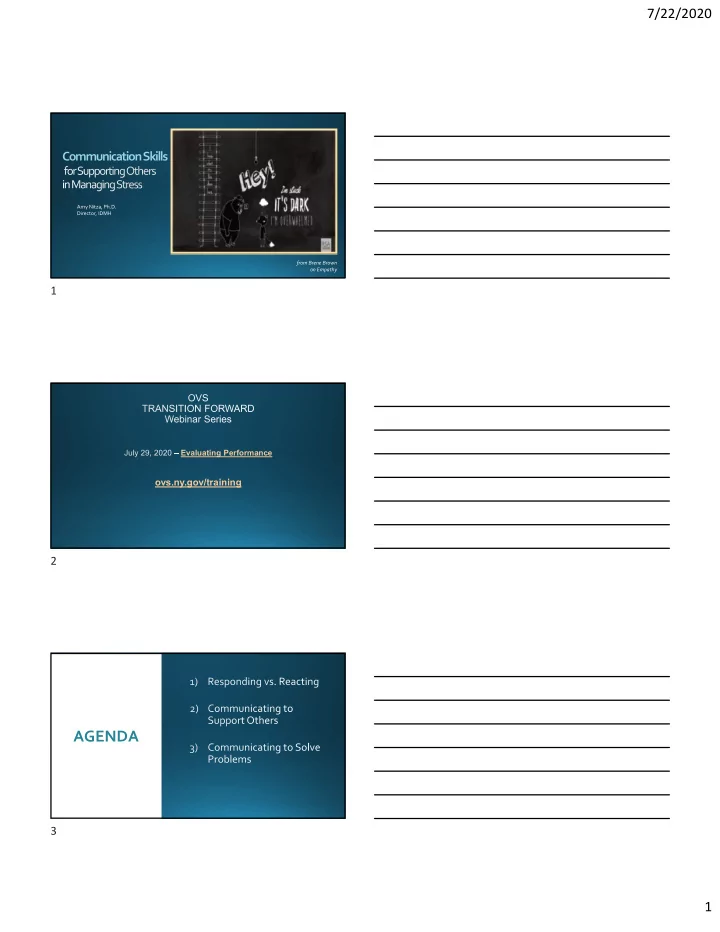

7/22/2020 Communication Skills Amy Nitza, Ph.D. Director, IDMH from Brene Brown on Empathy 1 Evaluating Performance ovs.ny.gov/training 2 AGENDA 3 1
7/22/2020 Responding versus Reacting: Communicating from the Green Zone 4 The The First First, the emot the emotional br brain (the n (the s smok oke a e alarm) Smoke Alarm Smok e Alarm de dete tects a cts a po pote tential t ntial threat ( t (i.e. a . a stre ress ssor) & & Next, the , the ratio tional br brain (the n (the w watch tchtower) examine ines the p the potent ntial thr threa eat, decides on on a The The pl plan o an of act action on, and act , and activates tes that pl plan an Watchtower Wa Then, Then, the the emot emotiona nal br brain (the n (the s smok oke a e alarm) re return rns t s to base selin line and and co continu ntinues mo s monitorin nitoring 5 In Daily In Daily Lif Life In Times In Tim s of Ex of Extreme treme or or Manag Managing s stress rel ress relies on es on Traumatic aumatic Stress Stress a h a heal alth thy y balanc nce e The smo smoke alarm is e alarm is const nstantly go going ing betw between the the emot emotional off - f - sugge uggest stin ing danger danger; it it ge gets s stuc uck and r ratio tional parts of of the the sition . . in in the ‘o ‘on’ n’ po posi brain. bra n. The brain be brain becomes mes o out o of balan balance; ce; t the watchtower i watc er is ov overwhel whelmed med by the e smoke alarm. smo e alarm. All All the brain’ e brain’s at s attention ge gets f focused on on tr trying to s to shut of off th f the s e smok oke a alarm, m, at at the ex expens nse o e of o other her brai brain functions. func 6 2
7/22/2020 Resilience = Being able to stay in, or quickly return to, a place of physiological, emotional, and mental balance after being disrupted. It is maintaining the ability to respond vs. react to difficult situations 7 Responding vs. Reacting Responding = Green Zone Reacting = Red Zone 8 Communicating to Support Others 9 3
7/22/2020 10 may not 11 Empathy Sympathy Understanding or feeling what another person is Feeling compassion, sorrow, or pity for the experiencing from within their frame of reference hardships that another person encounters from Brene Brown on Empathy 12 4
7/22/2020 13 Empathy can be expressed through You are saying… reflecting what you It sounds like… hear the person So you really… saying: Let me see if I have this right… • Experiences • Thoughts • Feelings If you get it wrong, apologize and ask the person to clarify their point. (Getting it wrong is not bad!) 14 Expressing Empathy These phrases should be avoided: • “Don’t feel bad.” • “I know how you feel.” • “Don’t cry.” • “It’s God’s will.” • “Try not to think • “It could be worse.” about it.” • “At least you still have.…” • “Let’s talk about • “At least [anything].” something else.” They are well ‐ intended, but are experienced as dismissive or invalidating 15 5
7/22/2020 “Don’t do something – just stand there.” 16 Communicating to Solve Problems 17 Behavior change by itself is unacceptable to people in distress… 18 6
7/22/2020 ‘How this has landed on me’ ‘What we ought to do about it’ Adapted from Hanson, R. (2018) 19 20 • What do I want for me? • What do I want from this relationship? • Recognize one • Do they trust my motives? • Invent one 21 7
7/22/2020 • Do others believe I respect them? • Instead of getting hooked and fighting back, break the cycle 22 Dealing with Anger o People may express their distress by getting mad at a number of targets – both rational and irrational (including you) o Do your best not to take it personally! o Often people just need to feel heard, and to vent o Validating their feelings and concerns without getting angry or defensive can go a long way (but is easier said than done) 23 Dealing with Anger o High emotionality is contagious o Try to avoid getting hooked o Consider anger as a sign of a lack of safety o What do you need to get the other person (and/or you) back in the green zone? o Anger is a surface level emotion o Try to connect/empathize with the emotion underneath the anger 24 8
7/22/2020 • Try making clear agreements A Few Other Tips • Avoid leading with “you…” • Avoid saying ‘but’ • Avoid asking “why” 25 Only genuine empathy is helpful and finally, remember… Remaining genuine with many Staying stressed ‐ out clients, staff, or Empathically colleagues requires self ‐ care Engaged Requires Know your limits so you can Self ‐ Care stay genuinely engaged 26 Q Thank y Thank you! u! & A 27 9
Recommend
More recommend